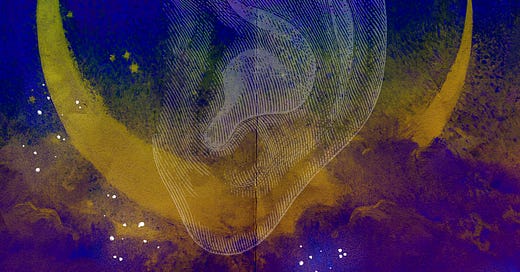The many things we stopped listening to
Cognitive deafness - limited by beliefs about how the world works.
"Wolkstein says (...) as long as your ear is not open to the Great Below, your understanding is necessarily limited. In Sumerian, the word for ear and wisdom is the same. It is said of Enki, the God of Wisdom and the King of the Deep Waters, who lives directly above the underworld, that his ears are 'wide open' and that 'he knows all things'."
In Portugal, December 8th is a Christian holiday of Our Lady of Conception (brewed from a much older winter sacred dynamics) and my late maternal grandmother's birthday. I always knew her as blind, an intense woman who was angry with the world. On this day, I celebrate her because although she couldn't see with her eyes, she could see in detail in many other ways. On this day of conception, I intend to concede other ways of seeing and feeling the world to be born.
When writing the book "The Sanctuary - Essays on Eco-Mythology," I chose to organize the chapters by three of our senses, the sensations we have lost through modern domestication, following the thread of narratives that have left us blind, deaf, and mute. These terms are metaphors for the profound sensory and relational alienation and dissociation of fragmented modern culture —the forgetting of how to relate differently. On the other hand, they do not refer to "imperfections," much less to the naming of "flaws" or physical incapacities of the various ways of understanding and being the world; nor do they postulate that individuals who understand and relate to the world in different ways are somehow inferior. I’m referring to cognitive deafness, which is limited by beliefs about how the world works.
To achieve this, we must open ourselves up to diversity beyond the confines and limitations of modern, verbal, and written language, opening up to other layers of porous relationships.
Along the way, I collect tales, stories and histories —both, the ones that remind and the ones that alienate. Recently, I came across two short stories about how cognitive deafness exiles us in an aseptic and inert world.
The Song of the Stars
The first comes from a Dutch anthropologist and his "study" of the San people in the Kalahari Desert in Africa. Other Western-modern apprentices of this African culture (self-proclaimed researchers) had already said things like: "(...) entering the world of the San is like entering the landscape itself; they are the landscape that they continually read and interpret; I as a Westerner am completely illiterate in this world."
Now, in the sixties of the twentieth century, this Dutch anthropologist spent some time camping with the San, and at night, the community told and sang stories and songs they heard from the stars. The Dutchman thought they were metaphors and symbols, but he never assumed that the stars really sang. When the tribe realized he didn't hear the stars, they mourned him deeply for his deafness and alienation, for not being able to hear the richness of the sky. They performed a ritual of mourning and pain for the loss of his ability to hear the stars.
The Melody of the Aurora Borealis
The second was transmitted by Dr. Predrag Slijepcevic, in his course and book "Biocivilizations," about the Sami, the tribe still living in Northern Europe. The Sami have always said, in their stories and songs, that the Northern Lights emit audible melodies and sounds. That they hear them.
Modern scientists have always denied this, attributing this "belief" to the cognitive and primitive inferiority of the Sami. After all, they're just a tribe from the frozen steppe, reindeer herders. According to modern science, the stories whispered by the Aurora Borealis are nothing more than superstition and belief, because it is impossible, according to their measurements and apparatus, for them to generate sound. Until a scientist recently proved that, in fact, this cosmic event, the colored lights in the sky, the product of the interaction between solar winds and chemical elements, generates sound! Although inaudible to modern ears, it is authentic. But everyone forgot to credit the ancient sensory wisdom of the Sami, who have always listened to the melodies of the Northern Lights.







This sparks so many thoughts and emotions! My mother’s birthday was also Dec 8. She was borderline deaf but able to “hear” in so many other ways. My step daughter’s BD is also on that day...
I love this. I mourn my inability to hear the stars